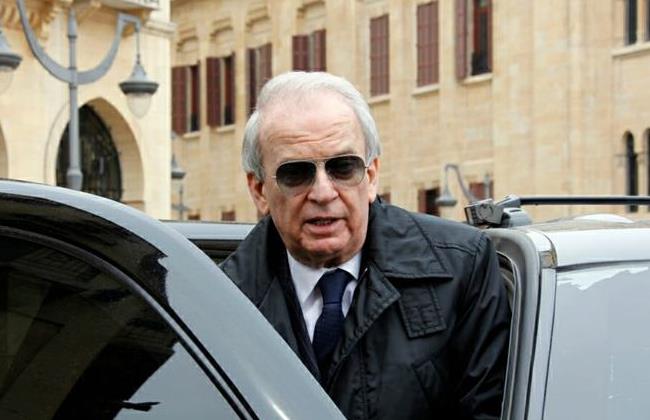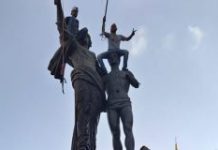STL hears testimony of Assad’s brazen intimidation of Hariri
Kareem Shaheen|/The Daily Star/Nov. 19, 2014
BEIRUT: Syrian President Bashar Assad humiliated Lebanon’s top statesman and demanded “complete obedience” from the nation’s politicians, an attitude that destroyed relations between Syria’s leader and former Prime Minister Rafik Hariri prior to his assassination, the Special Tribunal for Lebanon heard Tuesday.
Hariri was “humiliated by Syria’s president to show that Lebanese officials are nothing to them and that all must obey the orders coming from Damascus,” Marwan Hamade, the MP and former minister who survived a 2004 assassination attempt, said in testimony in The Hague.
Assad’s astonishingly brazen attempts at subjugating Lebanon’s political class and media outlets that opposed Syria’s dominance was laid bare in a second day of political testimony at the U.N.-backed tribunal, aimed at discerning a motive for the worst political assassination in modern Lebanese history.
Hamade described the details of pivotal meetings between Hariri and Assad that laid the groundwork for the collapse of relations between the two leaders before the assassination, including one in December 2003 after which Hariri reportedly suffered a nosebleed and smashed his head against the windshield of his car in anxiety over Assad’s behavior.
He detailed an alleged campaign of intimidation against the opposition media and Syrian intelligence’s attempts to spy on Hariri.
Hamade is the first of over a dozen politicians, journalists and advisers set to testify on political tensions in the run-up to the Hariri assassination and the breakdown of relations with Syria, the first time the country’s alleged role in the bombing has been examined in court.
Prosecutors said they were also considering summoning Druze leader and former Hariri ally Walid Jumblatt to testify. In a tweet, Jumblatt said he was ready to appear if summoned by the court.
Former Prime Minister Fouad Siniora is also expected to testify.
The STL is tasked with prosecuting those responsible for the 2005 Valentine’s Day bombing that killed Hariri and 21 others, plunging Lebanon into turmoil and street protests that ended Syria’s formal tutelage over its smaller neighbor.
The court has indicted five members of Hezbollah in connection with the attack, and the hearings are part of their ongoing trial in absentia.
No Syrian official has ever been charged in the case, nor have prosecutors indicated that they intend to do so, though they assert the political motive behind the attack lies in the deterioration of Syrian-Lebanese ties.
Defense lawyers have characterized the shift to Syria as a “sea change” and major expansion in the scope of a trial that has so far focused exclusively on the Hezbollah suspects.
In its first official reaction since the start of this new phase of trial, Hezbollah once again disavowed the tribunal, which it has derided in the past as an American-Israeli plot.
The party asserts that Israel assassinated Hariri.
“As for what is called the Special Tribunal for Lebanon, it does not concern us in any way, and we do not listen or read about it,” Hezbollah MP Mohammad Raad said after a meeting with former President Emile Lahoud at the latter’s residence.
Hamade’s testimony focused on a tense December 2003 meeting between Hariri and Assad and the run-up to the deeply unpopular extension of pro-Syrian President Lahoud’s term in 2004, which was key to the split between Hariri and Assad.
Hariri told Hamade after the meeting that he had been ordered by Assad to sell his shares at the anti-Syrian daily An-Nahar in a bid to bankrupt the newspaper, since Hariri was its second-largest shareholder after the Tueni family, which founded it.
“[Hariri] said the policy of the newspaper did not at all please President Assad and he suspected it was part of an overall media scheme to demand Syria’s withdrawal,” he said, adding that the Syrian president was angered by the writing of journalists Gebran Tueni and Samir Kassir, both of whom were assassinated in 2005, and editorials by the daily’s chief Ghassan Tueni comparing Assad’s fate to that of the Iraqi dictator Saddam Hussein. Hamade said the attempt at shutting down An-Nahar was part of a concerted campaign by Assad to close or intimidate anti-Syrian media, including a bomb attack on Hariri’s Future TV and the closure of MTV.
But Hamade, who was a close confidante of Hariri at the time and a former ally of Bashar’s father, Hafez, saved the more “humiliating” aspect of the meeting for later in the day.
He said the meeting between Assad and Hariri had been attended by three top Syrian officers – Interior Minister Ghazi Kanaan, military intelligence chief Rustom Ghazaleh and Gen. Mohammad Khallouf, a former military intelligence officer who has since defected from the Assad regime to fight with rebels seeking his ouster.
Two of the officers were armed, Hamade said, citing post-meeting discussions with Hariri.
“Hariri was subjected in this meeting to immense pressure,” Hamade said. “It was perhaps the beginning of the real estrangement between Rafik Hariri and the Syrian regime – a permanent estrangement.”
“He felt that he had been humiliated in this meeting,” he added. “It was like a lesson that was being given by President Assad to Prime Minister Hariri.”
Hamade said that Hariri was instructed to no longer to oppose Lahoud’s policies, being told that Lahoud bore Assad’s trust and reflected the opinions of Syria and its allies in Lebanon, and the premier was not allowed to object in the meeting.
He said Hariri nevertheless worked privately to counter Syria’s domination and was planning to vote against Lahoud’s extension.
The situation came to a head in August 2004, when Hariri, Jumblatt and Speaker Nabih Berri received invitations to Damascus delivered by Ghazaleh, who told them the upcoming meetings with Assad were intended to secure a majority to amend the Constitution and extend Lahoud’s mandate.
When the Druze leader refused to accept Lahoud’s extension, his invitation was withdrawn.
“Ghazaleh told him ‘I advise you not to do that, because there is no invitation to Damascus unless you tell me you are going to President Assad not to negotiate, but to agree,’” Hamade said, quoting Jumblatt.
Hariri was allowed to go to Damascus before conclusively agreeing to the extension. Hamade is expected to describe the aftermath of the meeting in his third day of testimony.
Prosecutors say the August 2004 meeting, in which Assad allegedly refused to consider removing Lahoud, was the crucial point at which relations between Assad and Hariri broke down, and the conspiracy to assassinate the former premier allegedly began a month later.
Hamade also described how Hariri discovered that his chief of bodyguards, Gen. Ali al-Hajj, was in fact spying for Ghazaleh and Syria’s intelligence.
He said Hariri fed him false information that Ghazaleh later called him and reprimanded him for, leading the former premier to fire Hajj from his staff, despite his closeness to the family.
Hajj would later be appointed as head of the ISF, and was arrested along with three other pro-Syrian generals in the aftermath of Hariri’s assassination. He was later released due to lack of evidence.
















